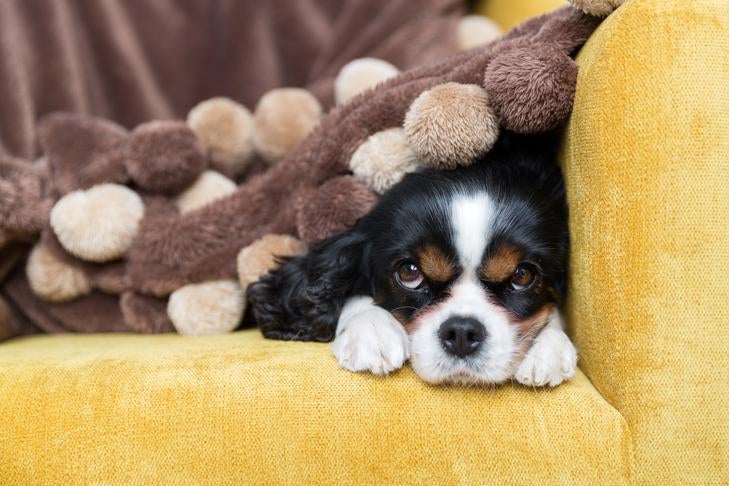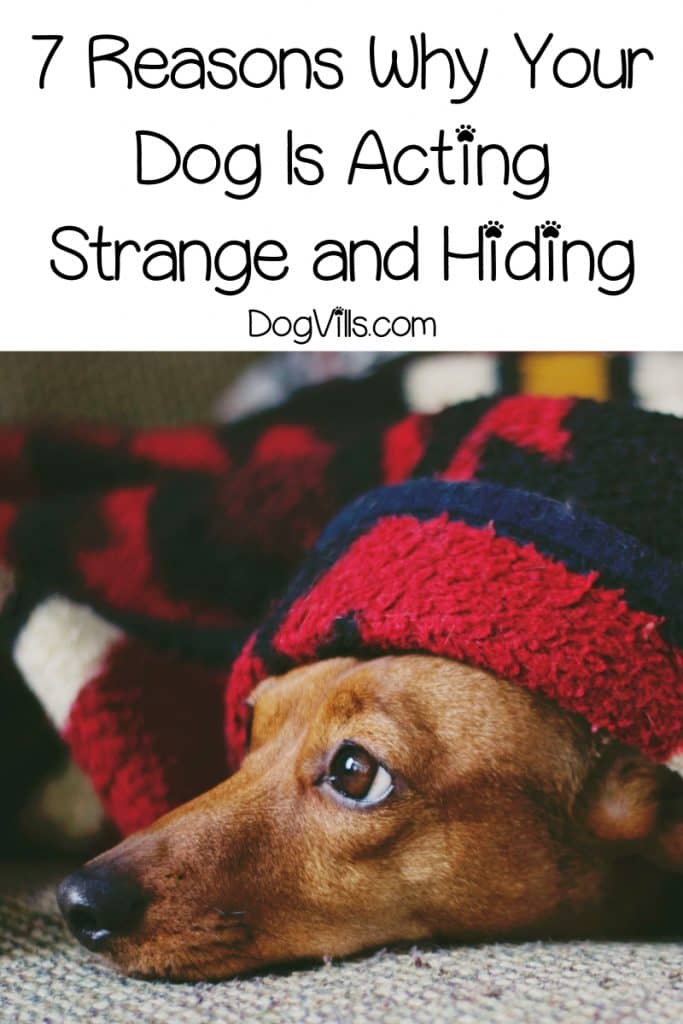Clubs Offering:
|
Have you ever wondered why your dog spends so much time hiding under the bed or a table? There are several reasons why this common dog behavior might be happening, and some of which are more concerning than others. If your pup insists on scurrying under the bed or a table to hide, there are a few likely explanations.
For many dogs, hiding under a bed or table out of sight can feel like a personal safe space.
“That’s their fun little fort to relax in,” says Jessika Jake, a CATCH Canine Academy certified dog trainer based in San Diego, California. “They like the little den environment.”
Jake says her Pomeranian is always searching for new hiding spaces around her home. However, she adds that there’s also a permanence in a bed or table that a dog might find comforting. Unlike a mat or a chair that might often be moved, dogs can depend on certain locations to remain unchanged.
“If there’s something scary going on, dogs love to find a hiding spot,” says Jake. “A bed or table might be a great spot where they like to go hide.”
Anything from a loud car alarm to fireworks might scare your pup. Jake’s dog was fearful of fireworks, so to help ease his worried mind, she gave him treats every time she heard fireworks. After enough repetition, her dog eventually learned to expect a treat whenever he heard loud noises.
Jake recommends using a soft voice to help calm your dog when they’re afraid. Next, try removing them from the environment. Ideally, get them somewhere safe and far away from whatever is scaring them.
They’re Physically Ill or Injured
“If they’re not feeling so well, they might find a place to hide,” affirms Jake.
When Jake’s dog was stung by a bee, he hid behind the toilet as a way to cope. If your dog is hiding and it’s not typical behavior, take a closer look to ensure they’re feeling well. At the first sign of any symptoms of illness or injury, visit your veterinarian to assess the situation.

There’s often an easy explanation for why dogs spend so much time under the kitchen table in particular. That is, they know they might find food there.
“If you have a dog that likes to supervise what you’re cooking and eating, they know they’re going to get it. Things like that hold their interest,” says Jake.
To keep them from loitering or begging, train them to stay out of the room while you are cooking or eating and reward them with treats for doing so.
7 Reasons Why Your Dog is Acting Strange and Hiding

Whenever my dog’s behavior changes all of the sudden, it always makes me Google the symptoms or ask questions on dog discussion boards.
I assume that you do the same since you’re reading this. Let me preface this by saying that I can’t tell you EXACTLY why YOUR dog is suddenly acting strange and hiding. Changes in behavior have many possible causes.
What I can do, though, is give you a rundown of the most common reasons to help you narrow things down. Before I do that, though, I just want to say one thing: CALL YOUR VET.
I can’t stress this enough: whenever your dog suddenly exhibits strange behaviors, your veterinarian should be your very first phone call.
The first thing that comes to my mind whenever someone says that their dog is acting strange and hiding is an illness.
That’s because dogs instinctively hide whenever they’re in pain to protect themselves from predators.
In addition to this, some dogs don’t want to be around people when they feel unwell.
Instead, these dogs prefer to lay somewhere dark and safe, for example, under your bed or in the closet.
Don’t freak out just yet if your dog is acting strange and hiding. Observe your pooch.
If Rover is ill, you’ll notice other health warning signs such as lethargy, vomiting, lack of appetite, diarrhea, frequent urination (or a sudden decrease in urination), change in coat’s appearance, and fever.
In addition to this, when you’re a pet parent, you develop something like a maternal instinct. For example, I always can tell that my pup is feeling worse for the wear by the way he moves or looks at me. So trust your gut.
Once again, I cannot stress enough the importance of calling your vet. Sure, your dog’s odd behavior could be related to a mild illness (like an ear infection). However, there are just too many potentially dangerous health issues that could be behind it. Kidney disease, liver dysfunction, a urinary tract infection…the list goes on and on.
Another reason why your dog is acting strange and hiding is fireworks. Dogs are sensitive to loud noises and bright, flashing lights.
Fireworks are not something that occurs regularly in your dog’s life. It’s an event that happens a couple of times a year.
It’s scary because it’s unpredictable, and your dog doesn’t understand what’s going on out there.
As such, fireworks tend to scare dogs senseless, especially if it’s your dog’s first exposure to illuminations.
It’s not unusual for a dog to spend the whole of New Year’s Eve hiding under the bed or shaking in the closet once the festivities begin.
The bad thing is that your dog might continue to be fearful of loud noises for weeks or months after the initial event. As a result, Rover might dash to his hiding place whenever something noisy is going on in the house.
To ease your dog’s fears and help them deal with fireworks, you should close all the windows and draw the curtains to block the lights and the sounds.
Besides fireworks, dogs often have storm phobias. They don’t like the sound of thunders or the bright flashes of lightning, so they pace, pant, whine, or hide during a thunderstorm.
Moreover, some dogs might act strange and hide all of a sudden because they are sensing an approaching storm. Such fearful behavior might continue for a while after the storm has passed.
During storms, you should provide your dog with a safe place to hide and be near him to provide emotional support.
Some specialists also suggest playing white noise or turning up the TV to drown the ranging storm.
Think about the days before your dog started acting strange and hiding. Did something happen that could have traumatized your dog?
For example, a fight with another dog during your daily walk when he was an impressionable puppy? Perhaps mistreatment by a previous owner?
Furthermore, sometimes dogs accidentally break something when they are alone at home. If they get hurt in the process, it could explain your dog’s weird behavior.
So anything that could startle your dog badly can make your pooch fearful and likely to hide if he feels that he’s in danger of experiencing the same trauma again.
In addition to this, dogs sometimes hide whenever they get reminded of a traumatic experience or an abusive situation from their past.
Angry voices, tensions in the house, a particular smell, or a hand gesture might scare an abused dog easily.
Once you discover what’s the trigger, you can work on desensitizing your dog to the stimulus. Or make sure that your dog doesn’t get exposed to them.
Separation anxiety and stress are other possible reasons why your dog is suddenly acting strange and hiding.
Dogs don’t like it when things change because they don’t understand what is happening. It seems like the end of the world is coming, and the only logical solution for your pet is to hide.
It’s not even just big changes that cause stress in your dog. Some dogs might get anxious because you’ve thrown away their favorite couch or moved a piece of furniture.
You working late or lack of enough daily exercise can also make your pooch anxious. Basically, anything that upsets their daily routine and schedule can be enough to send Fido racing under the bed.
To avoid stressing your dog, you should always introduce changes slowly whenever possible. In severe cases of anxiety and stress, your pooch may even need medications to help him calm down. Again, your vet or a good dog behaviorist can help you determine that.
Not all dogs are people-friendly. Some dogs are wary of people because of previous traumatic experiences or lack of proper socialization. Other breeds are just suspicious and alert by nature.
If your pooch gets nervous around other people, having strangers in your house might explain why your dog is acting weird and hiding.
In these situations, it’s better to leave your pooch alone for the time being.
Work on socializing your adult dog when Rover is calm, and you can control the situation. Then you might invite your friends again and allow Rover to get used to them.
Finally, sometimes, dogs act strange and hide because they want some peace and quiet.
Your furbaby might be tired of all the attention you’ve been giving him, or your children might be getting too much for Rover to handle.
In these cases, your dog might seek the comfort of a hiding place so that he can have a nap without someone disturbing him.
A dog who is acting strange and hiding is not always a reason for you to panic. Just like humans, dogs need space when they’re sad, worried, or anxious.
However, hiding could also be a sign of illness, especially if it continues for more than a day or two.
So, you talk about it with your vet if you believe that something isn’t right with your pet.
14 Signs Your Dog Doesn’t Love You (Even if You Think They Do)
Then you might be out of your mind with worry what’s causing this behavior change in your dog.